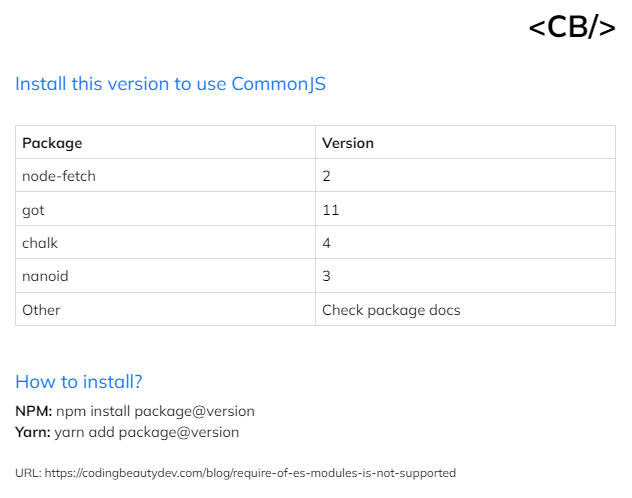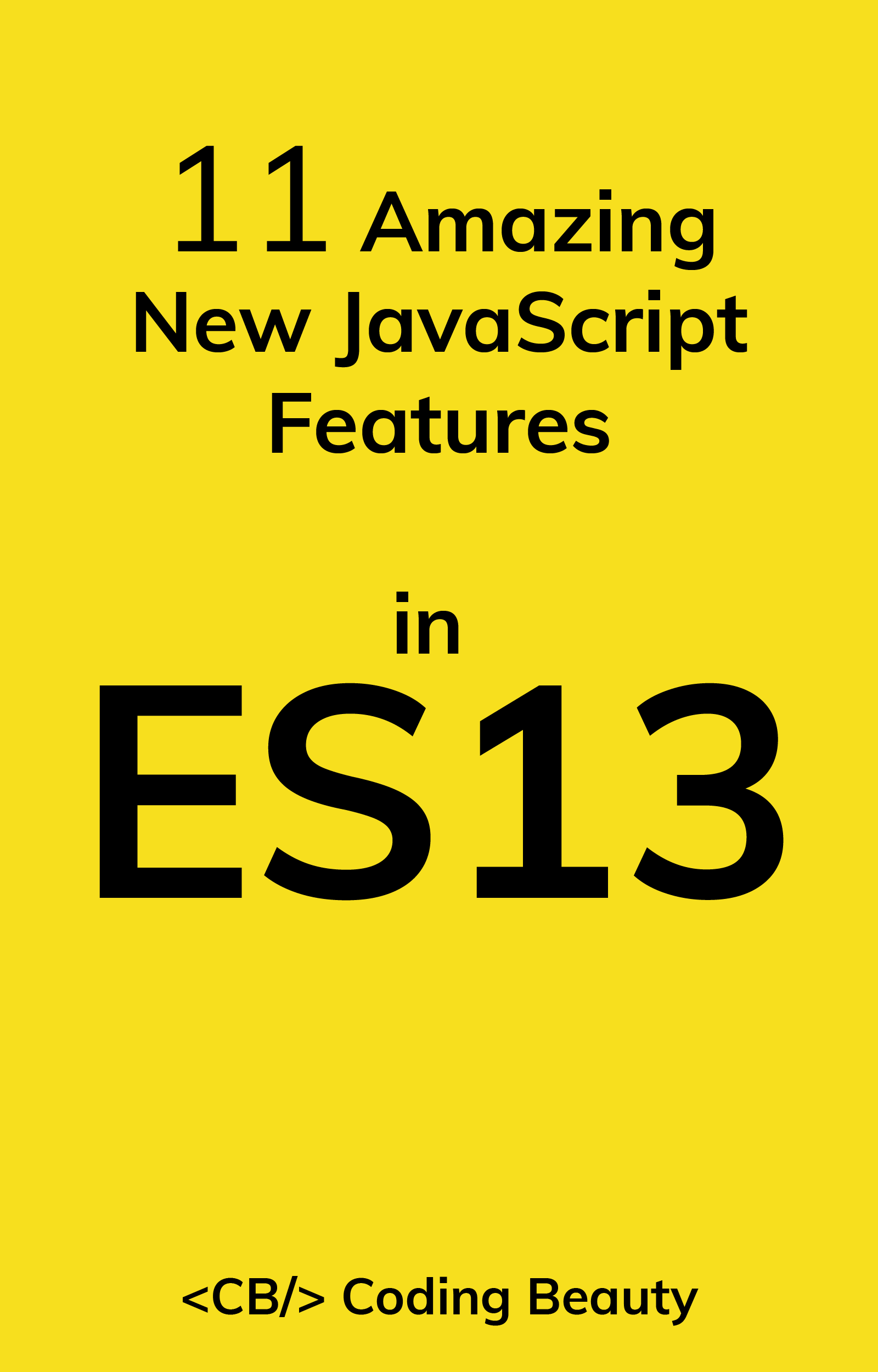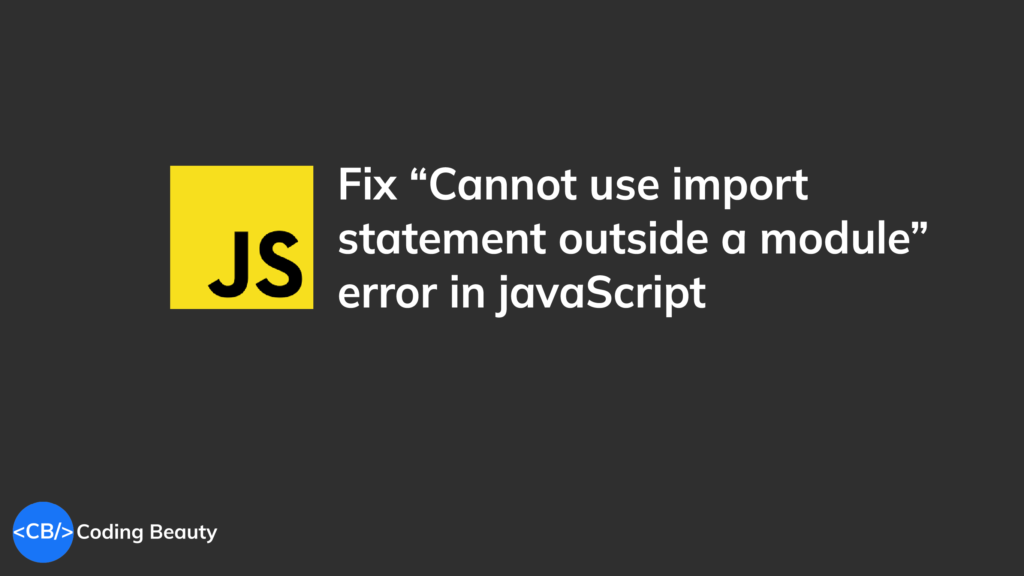Are you currently experiencing the “Cannot use import statement outside a module” error in JavaScript?

This is a well-known error that happens when you use the import keyword to load a file or package that is not a module.
Let’s learn how to easily fix this error in Node.js or the browser.
Fix “Cannot use import statement outside a module” in browser
Fix: Set type="module" in <script> tag
The “Cannot use import statement outside a module” error happens in a browser when you import a file that is a module without indicating this in the <script> tag.
<!DOCTYPE html>
<html>
<head>
<title>Coding Beauty</title>
<link rel="icon" href="favicon.ico" />
</head>
<body>
A site to make you enjoy coding
<!-- ❌ SyntaxError: Cannot use import statement outside a module -->
<script src="index.js"></script>
</body>
</html>
To fix it, add type="module" to the <script> tag.
<!DOCTYPE html>
<html>
<head>
<title>Coding Beauty</title>
<link rel="icon" href="favicon.ico" />
</head>
<body>
A site to make you enjoy coding
<!-- ✅ Loads script successfully -->
<script type="module" src="index.js"></script>
</body>
</html>
Fix “Cannot use import statement outside a module” in Node.js
The “Cannot use import statement outside a module” error happens when you use the import keyword in a Node.js project that doesn’t use the ES module import format.
// ❌ SyntaxError: Cannot use import statement outside a module
import axios from 'axios';
const { data } = (
await axios.post('https://api.example.com/hi', {
hello: 'world',
})
).data;
console.log(data);
Fix: Set type: "module" in package.json
To fix the error in Node.js, set the package.json type field to “module”.
{
// ...
"type": "module",
// ...
}Now you can use the import statement with no errors:
// ✅ Imports successfully
import axios from 'axios';
const { data } = (
await axios.post('https://api.example.com/hi', {
hello: 'world',
})
).data;
console.log(data);
If there’s no package.json in your project, you can initialize one with the npm init -y command.
npm init -yThe -y flags creates the package.json with all the default options – no user prompts for the fields.
Fix: Use require instead of import
Alternatively, you can fix the “Cannot use import statement outside a module” error in JavaScript by using the require() function in place of the import syntax:
// ✅ Works - require instead of import
const axios = require('axios');
const { data } = (
await axios.post('https://api.example.com/hi', {
hello: 'world',
})
).data;
console.log(data);But require() only works on the older, Node-specific CommonJS module system, and these days more and more modules are dropping support for CommonJS in favor of ES6+ modules.
For example, if you use require() for modules like got, node-fetch, and chalk, you’ll get the “require of ES modules is not supported error”.
// ❌ [ERR_REQUIRE_ESM]: require() of ES Module not supported
const chalk = require('chalk';
console.log(chalk.blue('Coding Beauty'));If you can’t switch to an ES module environment, you can fix this by dynamically importing the module with the async import() function. For example:
// CommonJS module
// ✅ Imports successfully
const chalk = (await import('chalk')).default;
console.log(chalk.blue('Coding Beauty'));Or, you can downgrade to an earlier version of the package that supported CommonJS and require().
npm install chalk@4
# Yarn
yarn add got@4Here are the versions you should install for various well-known NPM packages to avoid this ERR_REQUIRE_ESM error:

Fix “Cannot use import statement outside a module” in TypeScript
If the module field in tsconfig.json is set to commonjs, any import statement in the TypeScript source will change to require() calls after the compilation and potentially cause this error.
{
//...
"type": "module"
}Prevent this by setting module to esnext or nodenext
{
"type": "module"
}nodenext indicates to the TypeScript compiler that the project can emit files in either ESM or CommonJS format.
11 Amazing New JavaScript Features in ES13
This guide will bring you up to speed with all the latest features added in ECMAScript 13. These powerful new features will modernize your JavaScript with shorter and more expressive code.

